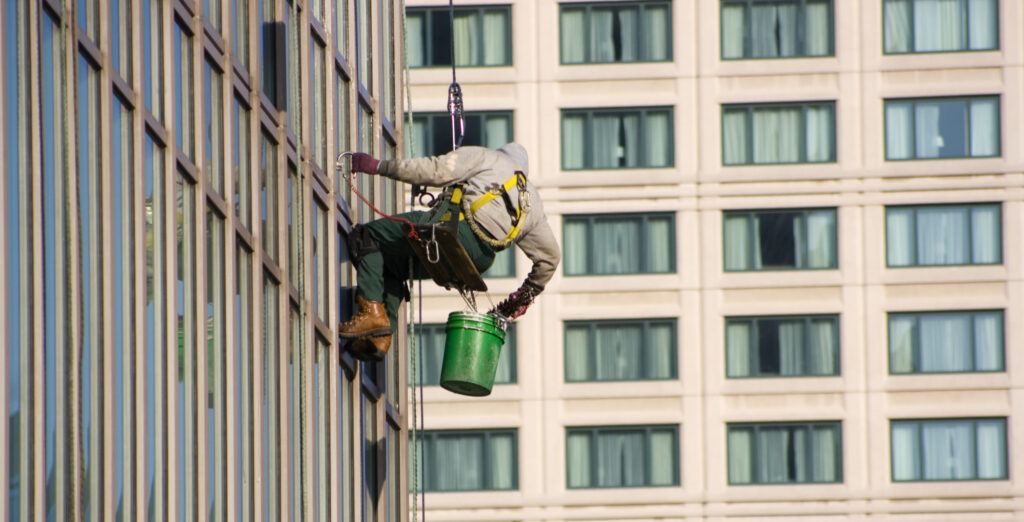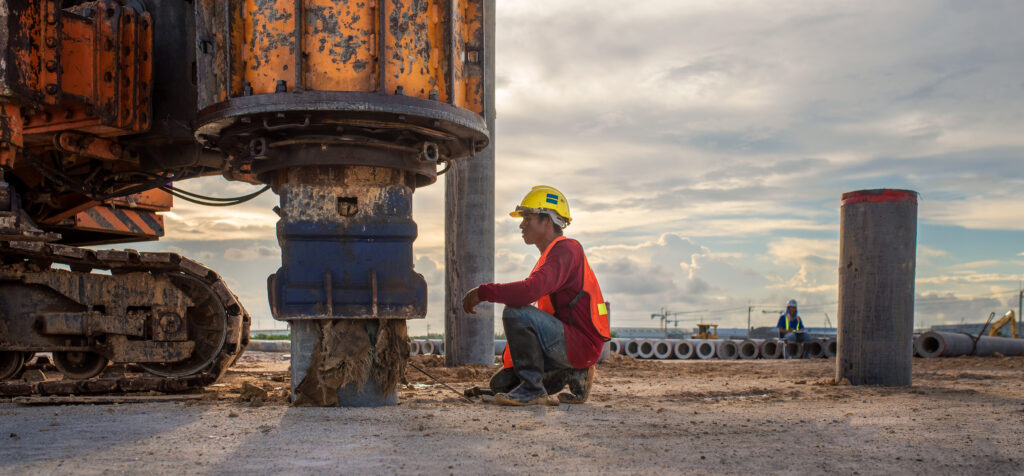Home » Chicago personal injury attorneys » Chicago workers’ compensation attorney
You deserve the maximum benefits under Illinois law if you were injured at work. Our Chicago workers’ compensation attorneys will pursue every option on your behalf.
Our team of Chicago workers’ compensation attorneys has a reputation for excellence. Law firm partner Mitchell Horwitz was recently named one of the top 10 workers’ compensation lawyers in Illinois, and everyone on our team shares his dedicated approach to workers’ compensation law.
Why should I choose Horwitz, Horwitz & Associates for my work injury case?
Not all Chicago workers’ compensation lawyers are equal in experience and skill. At Horwitz, Horwitz & Associates, we bring ample knowledge.
Our qualifications include:
- Extensive record of successful workers’ compensation cases
- Responsible for watershed Illinois Supreme Court decisions in favor of injured employees
Protecting the rights and interests of Chicago workers
Workers’ Compensation in Illinois is an adversarial system. The insurance company claims that the adjuster who makes the decisions on your case has no duty to you. The adjuster’s job is not to protect your interests.
The adjuster works for the employer’s insurance company – not for you. As a result, many valid claims are denied, which can put an injured worker and the worker’s family in a dire financial situation.
You have rights under Illinois law. We work to protect those rights by seeking the payment of the maximum amount of benefits available under the law.
Who may be liable for my injury?
In many cases, a third party may be liable for your injuries.
Third-party liability occurs when someone outside of your company injures an employee. It is not uncommon for another party to hold some responsibility for what occurred. Some examples of third-party liability include the following.
Negligent drivers
A vehicle accident occurred while performing your work duties. A negligent driver who caused the accident may be sued as a liable third party.
Manufacturers of dangerous or defective products
A manufacturer may have failed to warn of potential exposure and danger when interacting with certain substances used in the workplace. This could lead to the development of severe health conditions or illnesses.
A product used in performing work duties, such as machinery or equipment, may have failed, resulting in bodily injury.
A product is considered defective if altered in the production’s manufacturing, design, or distribution phases. Additionally, it is deemed defective if it does not have sufficient warning or warning labels.
The manufacturer, leasing company, or another party may hold third-party liability and can be sued to recover damages.
Other contractors
Another contractor working at the same site may be at fault for causing your injuries. This opens the door to a third-party lawsuit.
What industries see the most work injuries?
Our Chicago workers’ comp attorneys know a work injury can occur in any occupation. However, some industries are known to carry a higher risk of injury and illness, including:
- Construction
- State government (police, justice system, etc.)
- Private air transportation
- Warehousing and storage
- Local government transit and ground transportation
- Sporting events, entertainment performances
- Nursing and residential care (government or private)
- Sightseeing, tourism
Whether at a desk or a construction site, you are at risk for a work injury.
When the injuries are severe and result in short- or long-term disability, your future can be forever altered. Having a top-rated workers’ compensation lawyer in Chicago as you fight for justice and compensation is essential.
What are industries with special worker protection laws?
Special worker protection laws protect some workers. Those who perform work duties on the waterways in Illinois or those who work for the railroads are protected:
The Jones Act
The Jones Act applies to those who work on boats or other vessels. Sometimes, if an employee is injured at work because the employer was negligent, the employee can sue for damages.
Damages you can pursue under the Jones Act
Under the Jones Act, employees have the right to have their medical bills paid and a daily allowance to help them recover from their injuries.
A Jones Act lawsuit allows you to pursue:
- Past and future economic losses
- Pain and suffering
- Loss of quality of life
- Other damages
These cases often require the help of a Chicago harbor injury attorney to establish the employer was negligent.
FELA
The Federal Employers’ Liability Act, or FELA, provides specific protections for federal workers, including railroad workers.
Beginning a Chicago railroad claim or any other claim under FELA will require establishing negligence in some aspect of the case. Your employer may have failed to provide reasonably safe working conditions, leading to your injuries. Railroad companies must protect employees.
Damages you can pursue under FELA
Failing to provide a safe environment can lead to a FELA lawsuit. With this, employees can potentially recover compensation for damages. This includes:
- Medical costs
- Lost wages
- Lost earning potential
- Loss of quality of life
- Pain and suffering
- Other damages
How can you help with my case?
Some assume employers and insurance companies will treat them fairly and with compassion. They may also assume employers and insurance companies will pay all benefits due and owing.
However, this is not always what occurs.
Claims can be denied or disputed. Benefits may be suspended or underpaid. Authorization for medical treatment may be denied or delayed. Medical bills may be unpaid or even sent to collection.
When this happens, a hearing may be necessary before an Arbitrator at the Illinois Workers’ Compensation Commission. The IWCC may compel the employer or insurance company to pay benefits and authorize medical care.
Either party can then appeal the arbitrator’s decision to a higher level of the Commission. The process is complex and must be managed with experience and skill.
At Horwitz, Horwitz & Associates, our Chicago workers’ compensation lawyers strive to protect the rights of injured workers zealously. We always pursue the maximum possible benefits available through the workers’ compensation system and, when appropriate, a third-party claim.
What is the Illinois workers’ compensation system?
The workers’ compensation system is the product of an early 20th-century “Grand Bargain.”
The “Bargain” was intended to protect both employees and employers. Employees injured at work had to sue their employers for negligence to receive money for their injuries. In most cases, the workers were unsuccessful and recovered nothing.
In the rare cases where workers succeeded in proving negligence, employers were then found liable for negligence. They had to cover for significant jury awards, which was considered unfair.
Finally, business and labor entered into the Grand Bargain. Workers gave up their right to sue the employer for negligence but were entitled to medical care and compensation. These damages were paid for at the employer’s expense.
In the end, employers gave up their fault-based legal defenses. In exchange, they received strict limits on how much they would pay for work injuries.
The “no-fault” workers’ compensation system
In Illinois, an injured worker is entitled to medical care and compensation. Whether you or your employer were at fault for causing the injury does not matter.
However, with a no-fault system, state law limits the benefits you are entitled to. Minimum and maximum benefits are fixed based on the “statewide average weekly wage,” or “SAWW.”
For example, the minimum and maximum benefit rates for the period July 15, 2023 to January 1, 2024 are as follows:
Death, permanent total disability, amputation, or loss of an eye:
- Maximum weekly benefit: $1,861.18
- Minimum weekly benefit: $697.96
Permanent partial disability (without amputation or eye loss):
- Maximum weekly benefit: $998.02
- Minimum weekly benefit: $346.67 to $520.00 (amount varies based on the number of dependents)
Temporary total disability:
- Maximum weekly benefit: $1,549.07
- Minimum weekly benefit: $346.67 to $520.00 (amount varies based on the number of dependents)
Death benefits
Weekly benefits in a fatal claim are paid to the surviving spouse for life, not to exceed the greater of 25 years or $500,000.00, and to minor children of the decedent until they reach age 18.
Benefits may continue past age 18 if the child is enrolled in school but in no event past age 25. If the deceased left no surviving spouse or minor child, benefits may be available to other dependent family members.
Protection for employees and employers
The Illinois workers’ compensation system plays a vital role for employers. An employer is legally immune from suit for personal injuries, even if the employer was negligent. Few exceptions exist to this rule.
This same rule protects the employee as well. Employees have the right to workers’ compensation benefits for on-the-job injuries, regardless of the cause. Even if the employee caused the injury and there was no negligence on the employer’s part.
The Illinois Workers’ Compensation Act is a long and complex state statute that covers a wide range of issues, including:
- Arbitrations
- Attorney fees
- Emergency hearings
- Appeals
- Benefit rates
At Horwitz, Horwitz & Associates, our Chicago workers’ compensation lawyers are familiar with all facets of the Act. Our team is experienced in navigating this complex system and knows how to achieve positive results for our work injury clients.
Injured at work? Our top-rated Chicago workers’ compensation attorneys can help.
If you were injured on the job in Chicago, you deserve to be treated fairly and to recover compensation for your injuries. Contact us at Horwitz, Horwitz & Associates for a free case consultation with our skilled Chicago work injury attorneys. We have the experience and track record of success you want on your side. Call now.
Related articles for further reading
Can you get workers’ comp for repetitive stress injuries?
What injuries are covered under workers’ compensation in Illinois?











